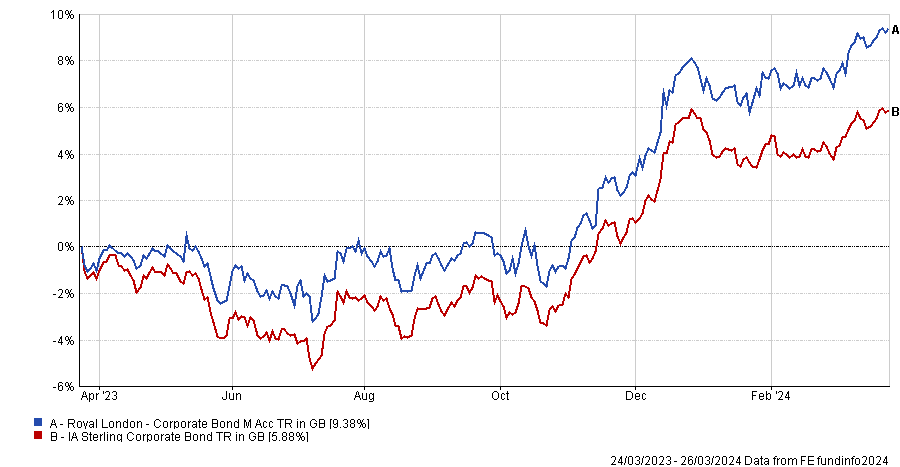Much of a manager’s job is to keep their nerve when markets are stressed and to always try to add value for investors.
That is much of what FE fundinfo Alpha Manager Shalin Shah and Matthew Franklin, who co-run the Royal London Corporate Bond fund, managed to do over the past 10 years, when the strategy has come very close to a perfect track record – only underperforming the IA Sterling Corporate Bond sector average in 2022 and by a mere 0.1 percentage points. This track record gained the fund the title of most consistent UK bond fund of the decade.
Below, the managers talk about keeping their nerve during the Credit Suisse takeover, the areas they think are worth researching and why they are cautious at present.
Performance of fund against sector and index over 1yr
Source: FE Analytics
What is your process?
Shah: We exploit the long-standing inefficiencies in sterling credit markets generated by investors focusing on ratings and benchmarks while undervaluing security and covenants.
Research is targeted to areas where we know we can really make a difference, focusing on bond documentation and the structure of our lending.
Finally, we want to provide an attractive level of income via a diversified portfolio of corporate bonds, with a strong focus on downside protection.
What are the limitations of credit ratings?
Franklin: Rating agencies have created a huge inefficiency in markets. Both active and passive investors will use ratings as their North Star to determine credit risk, but what is really meaningful is when credits move, not so much the fundamental risk. That creates a real opportunity for us.
Which areas do you think are worth researching?
Shah: If our analysts started analysing the cash flows out of US large-caps, for example in the supermarket sectors companies such as Walmart, and spent too much time there, that'd be taking away important time from some of the small-cap and mid-cap companies we can lend to.
Looking closer to home in the UK, we have bond secured on Sainsbury's supermarkets, but they're under a different name – Longstone. There, the offer document is a lot thicker, but once you've read through it, you understand that you're in a really superior lending position, senior capital structure secured on assets with a very low loan to value, giving you high confidence that you’ll get your money back as the bonds go towards maturity.
What positions haven’t worked in the past year or so?
Shah: We had a 4% position in Credit Suisse AT1 bonds when the bank failed and that cost us 12 basis points. Close Brothers’ AT1 bonds also fell by around five percentage points and the impact on the fund was one basis point.
Thames Water also hasn’t worked well. We held a small position in the holding company, which faced much stress and the bonds have fallen about 50 percentage points.
Could you see it coming for Credit Suisse?
Shah: Credit Suisse had a negative impact, but we actually added more value on it by buying their Senior Operating Company just before the UBS takeover.
That was a highly stressed situation for the market but when we did our analysis, we saw that it would have to burn through £100bn worth of capital before touching the most senior part of the capital structure operating debt.
We bought quite a significant chunk of that debt at around 92p and it now sits at around 105p, so a 14 points upside. We also de-risked the fund by selling more risky debts out of other banks.
What other positions have worked?
Shah: Secured debt added value, for example the housing association Swan Housing. But also some unsecured positions in HSBC and Westpac, where we held some US dollar-denominated floating rate notes.
We bought HSBC in the low 70s cash price and a few months later, they were taken out at par, so with a nice 40% return. It was a similar story with Aviva and AXA.
How are you positioned from here on?
Shah: Credit spreads are the tightest we've seen in a couple of years, so from that perspective, we're slightly cautious.
In terms of active positioning, we have been adding to shorter-dated bonds, where the attractive feature is higher government bond yields that are likely to fall more, and cutting our positions in the median space where the yield curve is inverted.
Secondly, the secured element continues to be a robust ballast for the fund, it's undervalued versus corporate unsecured debt that has tighter and a lot more, so we continue to add there where we can.
Finally, we continue to like financial debt and we're happy to go down the capital structure. However, we are looking at adding more to the short end rather than long because spread tightening may not be as easy to achieve from where we are, given how well bonds are performed.
What do you do outside of fund management?
Franklin: I've got a two-year-old, so I do less traveling than before and it’s more holidays with a kids club now. The activity that we all do as a team is badminton – Shalin is very good, I try hard.
Shah: My kids are bit older so we’re starting to do some more adventurous travel. This year, we’re going to Bali to see the Komodo dragons near Komodo island.




